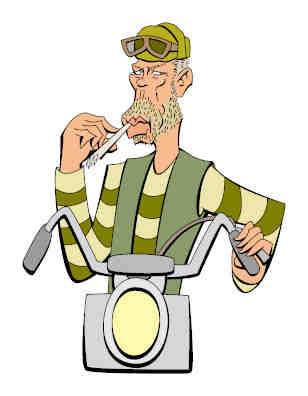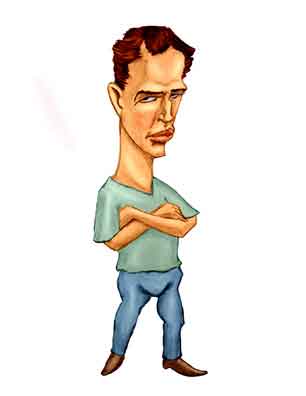Lee Marvin

(Click to Zoom In and Out)
Lest there be accusations of elitism, this tribute to film star Lee Marvin and the depiction of one of his early roles, is also a tribute to the American subculture therein depicted, a subculture which developed around the motorized velocipede. Even today this part of Americana has not always been portrayed in a positive light and - unjustly, certainly - has been subject much negative stereotyping1.
Footnote
The 1950's into the 1960's was the era of the "juvenile delinquent" movie: The Blackboard Jungle, Rebel Without a Cause, West Side Story, and even The Delicate Delinquent. But movies about the delinquents were being made in the 1920's and continue to this day.

Marlon
The Star
Of course, it was Marlon Brando who starred in the movie The Wild One, and Marlon was the good guy sort of. That is, Marlon played Johnny Strabler, a leader of a motorcycle gang that comes into a small California town and causes all sorts of trouble. But things really get out of hand when Chino - played by Lee - and his gang show up. There really weren't any good guys in the movie, Johnny was a good-bad guy and Chino was the bad-bad guy. Eventually the cops show up and drive the motorcycle gang out of the county2.
Footnote
Given all that happened in the movie, it's unlikely that in real life a motorcycle gang that caused such problems - which included one of the gang being killed - would have been told simply to ride off into the sunset.
When The Wild One was filmed, Lee was still in his twenties but like Henry Fonda he had success at landing roles from the beginning. He began acting shortly after World War II, and by the time The Wild One was filmed he had already appeared in over twenty television shows and three movies. That's twenty television shows and in the days when commercial television was just getting started.
By the mid-1950's Lee was landing good parts, almost always as a tough guy and often a hoodlum. In 1957 he even had the lead role in a weekly television series M Squad where he played a tough detective. The show ran for three years which doesn't seem like too long given that today's shows can drag on for 30 years (which is probably 29 years longer than they should). But such a run was considered a success in the early days del tuba de los idiotas.
As the Swinging Sixties rolled in Lee was a major actor. In 1962 he played the really bad guy Liberty Valence in The Man Who Shot Liberty Valence with John Wayne and Jimmy Stewart. That he could play characters other than tough guys and could handle comedy was clear in Cat Ballou (1965) - where his dual role landed him a Best Actor Oscar - and Paint Your Wagon (1969) which was a musical.
But in the 50's and 60's Lee mostly appeared in guest slots on television. He was in three episodes of The Untouchables of which the best was The Nick Acropolis Story. Nick (Lee) was a big-time bookie handling all the gambling in six states around Chicago. But Nick's heavy handed dealing - he has people he doesn't like rubbed out - gets Eliot Ness onto the case. That makes Frank Nitti - the Big Boss - mad. Nitti orders Nick to stop the killings or Ness will keep bugging them3. But Frankie Fershman, one of Nick's minions, decided to double cross Nick and make it look like Nick's hitmen were trying to rub out Nitti when all they were doing was bringing over his share of Nick's earnings.
Footnote
The Untouchables was based on the 1957 book of the same name by Eliot Ness and Oscar Fraley. Because the show lasted four seasons, the writers had to come up with more stories than in the book. Not only do Eliot and the others solve many more crimes than bootlegging but the Big Bad Guy was Frank Nitti, not Al Capone (in the book Frank is only mentioned four times). This was one way to avoid problems with the surviving members of Capone's family, but it may also have been a favor to Sonny Capone, Al's son, who co-producer Desi Arnaz knew when they were in school together.
The book itself, though, is to be read with caution as Oscar Fraley, who did the actual writing, wrote Eliot that he included some "gang buster" scenes to spice the narrative up. In fact, some episodes that have become accepted history - such as Eliot parading trucks seized in their raids by the hotel where Capone was staying - have no independent confirmation.
When Nitti confronts Nick, Nick tells Nitti it was Frankie who set the hit up. He'll deal with Frankie himself. Then in one of the eerier scenes of the entire show, Nick ends up in a darkened florist shop stalking Frankie with a huge pair of garden shears. As Nick snaps the shears together with a rhythmic snip, snip, snip, he says "I'm gonna cut your heart out, Frank" - snip, snip, snip. The terrified Frankie jumps through the front window into the street. Naturally Ness and the Untouchables just happen to show up and in the inevitable shootout Frankie is killed4. Nick, though, is arrested and as we learn from Walter Winchell's machine-gun like narration he spent 12 years in prison for income tax evasion5.
Footnote
Despite having three or four shootouts per week as in the show, the real Treasury Agent Eliot Ness probably never fired his gun except during target practice.
Footnote
The story, though, is complete fiction and there was never a real Nick Acropolis as described.

Walter Winchell
Machine-Gun Delivery
But without doubt one of Lee's best - albeit shorter - roles was in the 1963 Twilight Zone episode "Steel". Not only does Lee and character actor Joe Mantell put on convincing performances about an aging former boxer turned manager and his partner, but the episode is also instructive as it shows the difficulties of producing science fiction when television shows can be viewed into perpetuity.
"Steel" is - quote - "set in the future" - unquote. That is, in 1974. "Steel" Kelly (Lee) is a boxing manager but the catch is boxing had been banned in 1968. Instead the boxers are androids - robots that look (sort of) like people.
Without going into the details of the story, in the end their robot-boxer is such an old model that it breaks down before the fight and no one makes the spare parts anymore. Since Steel and his mechanic are on their last financial legs, Steel decides to assume the role of the robot himself without telling anyone. Naturally he gets creamed and he and Joe are only paid half of what was promised because the "robot" - that is, Steel - had put on such a rotten fight.
The story is quite good - it was written by Richard Matheson - but when looking back at the episode from over half a century it's clear that predicting the future is a risky business. As usual some technology has advanced at lightning speeds but other day-to-day staples have stagnated. That is, in "1974" there are human looking robots that can box, but automobiles, hair styles, and clothing remain late '50's or early '60's. Fedoras are still the preferred head gear, all the men are clean shaven, and there's not a leisure suit, Beatle haircut, beard, or mustache to be seen6.
Footnote
Eventually even the most well-thought plots and fictional universes will seem quaint with parachronisms peppering the plots. Why are astronauts using slide rules? Why are people living in Star Date 4523.3 wearing 1960's hair styles? How is the Soviet Union still around after the Millenium? Why are companies in 2001 still using logos that were discarded in the 1980's? Why "far in the future" are there still payphones everywhere and no cellphones or Email?
Nothing ruins a futurist's forecasts worse than the future. As late as the 1950's, there was still serious speculation that some kind of critters might be living on Mars, and some people thought there really could be canali on the surface. But beginning in the 1960's real spaceships began to reach the Moon and other planets, and it became clear that stories like Ray Bradbury's The Martian Chronicles were not - as Eliza Doolittle said - bloody likely.
Still like most Twilight Zone episodes, the story had a message. On the surface we learn that man can't beat the machine, but he will never stop trying. A less obvious moral is that just because you want something to be true, it doesn't mean it will be true.
In his later years, Lee purchased a home near Tucson, Arizona, and became involved with community efforts and supported wildlife rehabilitation of the region. He gave his time to the local arts and in 1977, he narrated "Peter and the Wolf" for the Tucson Symphony Youth Orchestra. What he really liked about Tuscon was everyone just accepted a major celebrity living in their midst as another citizen. "They see you driving around in a pickup and that’s it", he said, "They leave you alone." It was in Tucson that Lee died at the early age of 63.
References
Lee Marvin: Point Blank, Dwayne Epstein, Schafner Press, 2013.
"Lee Marvin", Internet Movie Data Base.
"The Nick Acropolis Story", Robert Stack (actor), Bruce Gordon (actor), Constance Ford (actor), Lee Marvin (actor), Walter Winchell (narrator), Don Medford (director), Curtis Kenyon (script), John Mantley (script), Eliott Ness and Oscar Fraley (original book), Desilu Studios, 1961, Internet Movie Data Base.
"The Nick Acropolis Story", Robert Stack (actor), Lee Marvin (actor), Bruce Gordon (actor), Constance Ford (actor), Walter Winchell (narrator), Don Medford (director), Curtis Kenyon (script), John Mantley (script), Eliott Ness and Oscar Fraley (original book), The Untouchables, Desilu Studios, 1961, Internet Movie Data Base.
"Steel", Lee Marvin (actor), Joe Mantell (actor), Rod Serling (narrator), Don Weis (director), Curtis Kenyon (script), Richard Matheson (script and story), The Twilight Zone, CBS, 1963, Internet Movie Data Base.
"Lee Marvin Lived, Worked and Died in Tucson", Elaine Raines, Arizona Daily Star, October 22, 2008.
"Les Incorruptibles Série, TV 1959 - ABC (US)", KIFM Ouest France.
"10 Anachronisms in Great Sci-Fi Movies", John Brandon, Popular Mechanics, August 26, 2013.